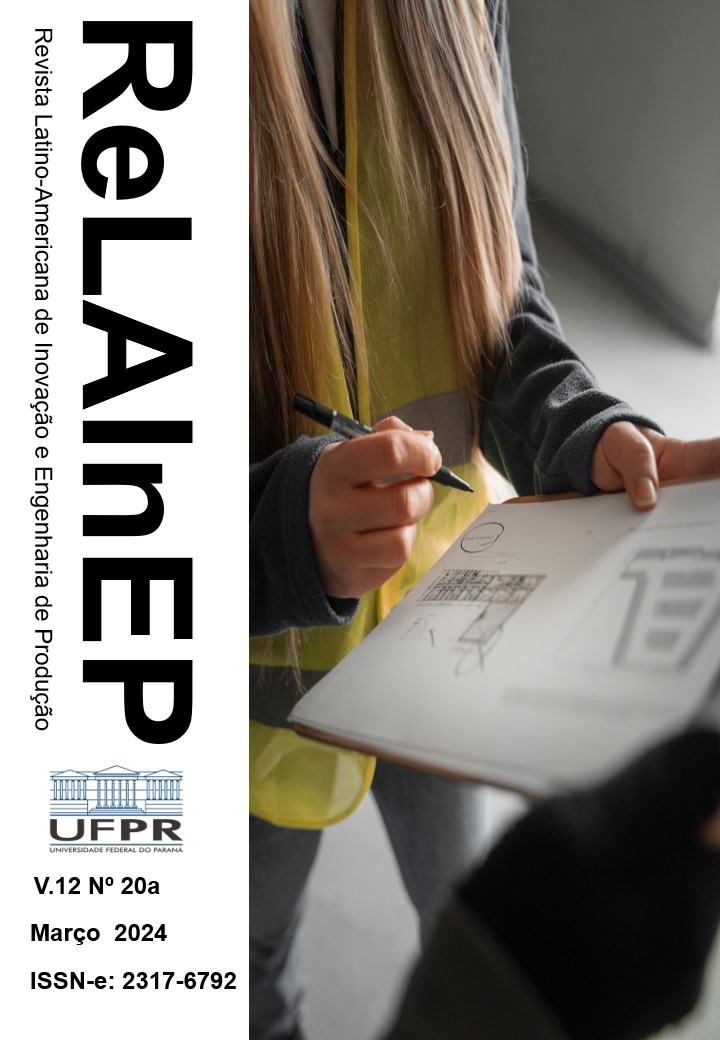DEPLOYMENT OF A VISION SENSOR AND AN EXPERT SYSTEM TO MINIMIZE PLASTIC WASTE: A CASE STUDY IN COLORED OPTICAL TUBES EXTRUSION
DOI:
https://doi.org/10.5380/relainep.v12i20.94793Palavras-chave:
Cleaner Production, solid waste minimization, Industry 4.0, vision sensor, expert systemResumo
Industry 4.0 has expanded the alternatives to design more sustainable processes. Among the technologies of this industrial phase, IoT (Internet of Things) technology allows the linkage of devices that generate data at high volumes (big data), supporting the creation of Artificial Intelligence (AI) models to perform optimal operating standards to minimize waste in the production. By means of vision sensor and AI deployment, this study aimed to reduce the polybutylene plastic waste in an extrusion line of colored tubes, in which most of the waste is generated during the color transition. For that, a vision sensor that transfers the tube color in real-time was installed, which made it possible to set acceptance ranges for the standard colors of the tubes based on the elicitation of the operators' knowledge. These ranges allowed the setup of an expert system that warns the operator, by a light signal, the right time to start the production. The suggested technology demonstrated to be 11.47% more efficient in waste reduction in color transitions. It also allowed the identification of the requirements for the deployment of this technology in plastic extrusion, so it can promote overall waste reduction, which requires improvements in operation, standardization, and employee training.
Downloads
Publicado
Como Citar
Edição
Seção
Licença
Autores que publicam nesta revista concordam com os seguintes termos:
- Autores a partir da submissão cedem integralmente os direitos patrimoniais da obra à publicação, entretanto permanecendo detentores de seus direitos morais (autoria e identificação da obra) e conforme a Licença Creative Commons, CC BY-NC – atribuição não comercial conforme a Política de Acesso Aberto adotada pelo Portal de Periódicos da UFPR. É permitido acessar, baixar, copiar, imprimir e compartilhar desde que não seja para fins comerciais e citando a referida fonte, conferindo os devidos créditos de autoria e menção a Relainep.
- Autores têm autorização para assumir contratos adicionais separadamente, para distribuição não-exclusiva da versão do trabalho publicada nesta revista (ex.: publicar em repositório institucional ou como capítulo de livro), com reconhecimento de autoria e publicação inicial nesta revista.
- Autores têm permissão e são estimulados a publicar e distribuir seu trabalho online (ex.: em repositórios institucionais ou na sua página pessoal), já que isso pode gerar alterações produtivas, bem como aumentar o impacto e a citação do trabalho publicado (Veja O Efeito do Acesso Livre).
Para isso, deve-se fazer o DOWNLOAD DO FORMULÁRIO, assinar e fazer o upload como Documentos Suplementares com o título "Declaração do autor", junto da submissão do artigo.


